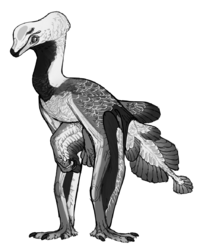Shibettan: Difference between revisions
No edit summary |
|||
| Line 1: | Line 1: | ||
{{Region icon Sparkalia}} | {{Region icon Sparkalia}} | ||
{{wip}} | {{wip}} | ||
[[File: | [[File:DinoKobold.png|200px|thumb|An image of a male Shibettans]] | ||
Shibettans [Voidite: Rirkittar] [Shibettan: Æthelryth] are a species of generally beige, brown and/or black feathered kobold found in and around northern [[Voidkree]]. They get the name "Shibettan" from the God that a majority of them worship known as Shiber, a dragon of sort which gave birth to kobolds through it's breath, which was said to have molded clay and stone into the kobolds today though this is assumed to be a religious myth and has been stated that it has no proof to back it this claim. In Voidian society Shibettans aren't treated any differently from any other humanoid in Voidkree and are allowed to get the same jobs Voidians have. | Shibettans [Voidite: Rirkittar] [Shibettan: Æthelryth] are a species of generally beige, brown and/or black feathered kobold found in and around northern [[Voidkree]]. They get the name "Shibettan" from the God that a majority of them worship known as Shiber, a dragon of sort which gave birth to kobolds through it's breath, which was said to have molded clay and stone into the kobolds today though this is assumed to be a religious myth and has been stated that it has no proof to back it this claim. In Voidian society Shibettans aren't treated any differently from any other humanoid in Voidkree and are allowed to get the same jobs Voidians have. | ||
Revision as of 19:36, 13 November 2022
This article is incomplete because it is pending further input from participants, or it is a work-in-progress by one author. Please comment on this article's talk page to share your input, comments and questions. Note: To contribute to this article, you may need to seek help from the author(s) of this page. |
Shibettans [Voidite: Rirkittar] [Shibettan: Æthelryth] are a species of generally beige, brown and/or black feathered kobold found in and around northern Voidkree. They get the name "Shibettan" from the God that a majority of them worship known as Shiber, a dragon of sort which gave birth to kobolds through it's breath, which was said to have molded clay and stone into the kobolds today though this is assumed to be a religious myth and has been stated that it has no proof to back it this claim. In Voidian society Shibettans aren't treated any differently from any other humanoid in Voidkree and are allowed to get the same jobs Voidians have.
In recent centuries Shibettans have been treated better and better with their true equality with Voidians coming in the year 1584 AR where after weeks of protests by both Shibettans and Voidian alike, the parliament passed the "Humanoid Equality Act" on 17th of Novus much to the dislike of Voidian ultranationalist groups. Ever since the act, institutions that used to turn away shibettans have since been forced to shutdown or become more inclusive. In more recent years there have even been reports of Voidian-Shibettan couples and families.
General Attributes
Size
The size of the Shibettans varies slightly though on average a male Shibettan ranges in height from 110-130cm with females ranging in heights of 90-115cm. The tallest Shibettan on record reached heights of 186.4cm which by human standards is not at all astounding but for kobolds it is an impressive height.
Diet
Shibettans, much like other kobolds are carnivorous and most of their food culture reflects that with the only plants every being used in a meal are just for seasoning.
Physical Description
Shibettans are short bipedal reptiles/avians with a layer of beige, brown or black feathers across their body though a large minority of Shibettans do have some form of genetic leucism which gives them white to light grey feathers. Their lower half possess digitigrade legs which end in three clawed toes and a tail, meanwhile the upper half is relatively humanoid with the only differences being the head and face with Shibettans having a beak similar to that of a crow though more hooked and a ridge of large feathers along the back of the head and neck along with two feather covered ears.
